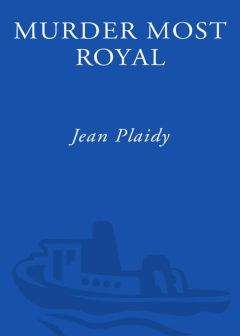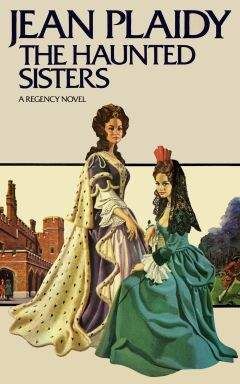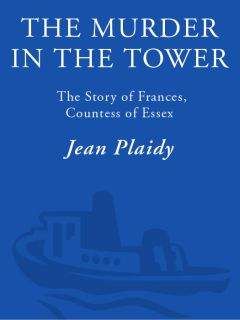So, at the highest peak of glory she had so far reached, she could enjoy the pomp and ceremony of this visit to France, which was being conducted as a visit of a king and his queen. The King was ready to commit to the Tower any who did not pay her full honor. When, a month ago, she had been created Marchioness of Pembroke she had acquired with this high honor the establishment of a queen. She must have her train-bearer, her ladies of the bedchamber, her maids of honor, her gentlemen-in-waiting, her officers, and at least thirty domestics for her own use. What Henry wished the world to know was that the only thing that kept the Marchioness from being Queen in name was the marriage ceremony. “By God!” said Henry to Anne. “That shall take place before you are much older, sweetheart!”
They had stayed four days at Boulogne, and there Anne had met with some slight rebuff, being unable to attend the festivities which the French arranged for Henry, as the French ladies had not come with Francis. It was understandable that Francis’s wife should not come, for on the death of Claude he had married Charles’s sister Eleanor, and Henry was known to have said, when the visit was being discussed, that he would rather see a devil than a lady in Spanish dress. The Queen of France therefore could not come. There remained Francis’s sister, the Queen of Navarre, but she had pleaded illness. Consequently there were no ladies of the French court to greet Henry and his Marchioness. Doubtless it was a slight, but such slights would be quickly remedied once Anne wore a crown.
Now they were back at Calais and very soon, with her ladies, Anne would go down to the great hall for the masked ball; she must however wait until supper was concluded, since the banquet was attended only by men. Contentedly she browsed, thinking of the past months, thinking of that state ceremony at Windsor, when the King had made her Marchioness of Pembroke—the first woman ever to be created a peer of the realm. What a triumph that had been! And how she, with her love of admiration and pomp, of which she was the center, had enjoyed every minute of it! Ladies of noble birth, who previously had thought themselves so far above her, had been forced to attend her in all humility; Lady Mary Howard to carry her state robes; the Countesses of Rutland and Sussex to conduct her to the King; my lords of Norfolk and Suffolk with the French ambassador to attend the King in the state apartments. And all this ceremony that they might do honor to Anne Boleyn. She pictured herself afresh, in her surcoat of crimson velvet that was lined with ermine, her lovely hair flowing; herself kneeling before the King while he very lovingly and tenderly placed the coronet on the brow of his much loved Marchioness.
And then to France, with Wyatt in their train, and her uncle Norfolk and, best of all, George. With George and Wyatt there, she had felt secure and happy. Wyatt loved her as he ever did, though now he dared not show his love. He poured it out in his poetry.
“Forget not! O, forget not this!—
How long ago hath been, and is,
The mind that never meant amiss—
Forget not yet!
Forget not then thine own approved,
The which so long hath thee so loved,
Whose steadfast faith yet never moved:
Forget not this!”
She quoted those words as her ladies helped to dress her. Wyatt would never forget; he asked her not to. She smiled happily. No, she would not forget Wyatt; but she was happy tonight for she was assured of the King’s steadfastness in his intention to marry her. He had declared this, but actions speak so much louder than words; would he have created her Marchioness of Pembroke, would he have brought her to France if he were not even more determined to make her his Queen than he had been two years ago? She felt strong and full of power, able to bind him to her, able to keep him. How could she help but be happy, knowing herself so loved! George was her friend; Wyatt had said he would never forget. Poor Wyatt! And the King had met the disapproval of his people, even faced the possibility of a tottering throne, rather than relinquish her.
Courage made her eyes shine the brighter, made her cheeks to glow. Tonight she was dressed in masquing costume; her gown was of cloth of gold with crimson tinsel satin slashed across it in unusual fashion, puffed with cloth of silver and ornamented with gold laces. All the ladies were dressed in this fashion, and they would enter the hall masked, so that none should know who was who. And then, after the dancing, Henry himself would remove the masks, and the ladies would be exhibited with national pride, for they had been chosen for their beauty.
The Countess of Derby came in to tell her it was time they went down, and four ladies in crimson satin, who were to lead them into the hall, were summoned, and they descended the stairs.
There was an expectant hush as they entered the hall which at great cost Henry had furnished specially for this occasion. The hangings were of tissue of silver and gold; and the seams of these hangings had been decorated with silver, pearls and stones.
Each masked lady was to select her partner, and Anne chose the King of France.
Francis had changed a good deal since Anne had last seen him; his face was lined and debauched; she had heard alarming stories of him when she had been in France, and she remembered one of these was of the daughter of a mayor at whose house Francis had stayed during one of his campaigns. He had fancied the girl, and she, dreading his advances and knowing too well his reputation, had ruined her looks with acid.
Francis said he could think of no more delight to follow supper than the English King’s idea of a ball in which the ladies were masked.
“One is breathless with suspense, awaiting that moment when the masks are removed.” He tried to peer lasciviously beneath hers, but laughingly she replied that she was surprised he should be breathless. “It is the inexperienced, not the connoisseur, is it not, who is more likely to be reduced to such a state?”
“Even connoisseurs are deeply moved by masterpieces, Madam!”
“This is what our lord King would doubtless call French flattery.”
“’Tis French truth nevertheless.”
Henry watched her, jealous and alert, knowing well the French King’s reputation, distrusting him, disliking to see him in conversation with Anne.
Francis said: “It is indeed exciting to contemplate that we have the Lady Anne here with us tonight. I declare I long to see the face that so enchants my brother of England.”
“Your curiosity will be satisfied ere long,” she said.
“I knew the lady once,” he said, feigning not to know it was with none other that he now danced.
“That must have been very long ago.”
“A few years. But such a lady, Madam, one would never forget, you understand.”
She said: “Speak French, if you wish it. I know the language.”
He spoke French; he was happier in it. He told her she spoke it enchantingly. He told her that he would wager she was more fair than the Lady Anne herself, for he had never set eyes on such a lithesome figure, nor heard such a melodious voice; and he trusted she had the fairest face in England and France, for he would be disappointed if she had not!
Anne, feeling Henry’s eyes upon her, rejoiced in Henry. He was a king and a great king; she could not have endured Francis for all the kingdoms in the world.
Henry, impatient of watching, would now remove the masks; and did so, going first to Anne.
“Your Majesty has been dancing with the Marchioness of Pembroke,” he told Francis, who declared himself astonished and delighted.
Henry moved on, leaving Anne with Francis.
“And what did I say of my old friend, little Anne Boleyn?” he said.
Anne laughed. “Your Majesty was fully aware with whom he danced.”
“I should have known that one so full of grace, so pleasant to the eye and the ear, could be none other than she who will soon, I trust, be my sister of England. I congratulate myself that she chose to dance with me.”
“Ceremony, as Your Majesty will well understand, demanded it.”
“You were ever unkind, fair lady! That I well remember.”
“Tell me of your sister.”
They talked long together; Anne’s laughter rang out now and then, for they had many reminiscences to share of the French court, and each could bring back memories to the other.
Henry watched, half proud, half angry. He had ever been jealous of Francis; he wondered whether to join them or leave them together. He did not care to see Anne in such close conversation with the lecher Francis, and yet it must be so for he was the King of France, and honor shown to Anne was honor shown to Henry. Francis’s approval at Rome could mean a good deal, for though Charles was the most important man in Europe, might not Henry and Francis together carry more weight than Katharine’s nephew?
The dance broke up; the ladies retired. Henry talked with his royal guest. Francis suggested he should marry Anne without the Pope’s consent. Henry did not see how this could be, but enjoyed such talk; it was pleasant to think he had French support behind him.
He went to Anne’s chamber, and dismissed her ladies.
“You were indeed a queen tonight!” he said.
“I trust I did not disgrace my King.”
She was gay tonight, savoring the success of the evening; adorable in her costume of cloth of gold and crimson.
He went to her and put his arms about her.
“The dresses were the same, but you stood out among them all. Had one not known who you were, it would have been easily seen that you were she who should be Queen.”
“You are very gracious to me.”
“And you are glad I love you, eh?”
She was so very happy this night that she wanted to shower happiness all about her; and on whom should it fall but on her royal benefactor!
“I was never happier in my life!” she said.
Later, when she lay in his arms, he confessed to jealousy of the French King.
“You seemed to like him too well, sweetheart.”
“Would you have had me ungracious to him? If I seemed to like him, it was because he was your guest.”
“Methought you appeared to coquette with him a little.”
“I did only what I thought would please you.”
“’Twould never please me, Anne, to see your smiles given to another!”
“My smiles! Bah! If I smiled too warmly then ’twas because I compared him with you and was happy in the comparing.”
Henry was overjoyed.
“I declare he puts on years as one would put on state robes; he is weighed down with them. I never thought him handsome. . . .”
“Debauchery is apparent in his face,” said Anne.
Henry’s prudish little mouth lifted into a smile.
“I would not care to own his reputation!”
Then she amused him with an imitation of the French King, recounting what he had said and what she had answered; and the King laughed and was very happy with her.
In the morning Francis sent Anne a jewel as a gift. Henry examined it, was delighted with its worth, and jealous that it had not come from himself.
He gave her more jewelery; he gave of his own and Katharine’s and even his sister’s, Mary of Suffolk. The King was more deeply in love than ever.
When it was time for them to leave Calais there was a high wind and it was unsafe to cross the Channel. Anne was reminded of that stay at Dover; but then she had been a seven-year-old girl of no importance whatever, trying to listen to those about her and learn something of life. Pleasant it was to think back, when one had come so far.
They beguiled the days with dice and cards, at which the King lost heavily and Anne almost always won; nor did it matter if she lost, for the King would pay her debts. One of the players was a handsome young man named Francis Weston for whom Anne conceived a genuine liking, and he for her. They played by day and danced at night; they were hilarious over the cards; there was much fun to be had at “Pope Julius,” the favorite game of the court, with its allusions to matrimony, intrigue and the Pope—they all found it so apt in view of the pending divorce. Thus passed the days, with Anne happier than she had been since deciding to occupy the throne, more secure, more content.
The old year was dying, and Christmas came. Still the Pope was adamant; still action hung fire. Four years ago Anne had become the King’s mistress, and now, at Christmas of the year 1532, still she waited to be his Queen.
She was pale and listless.
“Does aught ail thee, sweetheart?” the King asked her.
“Much ails me,” she told him.
The King was alarmed.
“Darling, tell me instantly. I would know what is wrong, and right it.”
She said very clearly: “I fear he who should follow Your Majesty as King of England will after all be but a bastard.”
Henry was beside himself with the importance of this news. Anne was pregnant! A son was what he wanted more than anything—next to Anne herself—on Earth. Anne, who should have been the Queen long ere this—and had they married she would have given him a son by now, for it had ever been her wish that no children should be born to them until she was Queen—Anne was with child. His child! His son! He who should be King of England!
“And by God,” said the King, “he shall be!” Now he was all tenderness, all loving care; that body which sheltered his son had become doubly precious. “Fret not, sweetheart. Be done with fretting for evermore. I declare I’ll endure this delay no longer. I’ll be cut free from that canting Pope, or, by God, much blood will flow!”
Anne could smile; this was the happiest thing that could have happened; this would decide him. She was determined that her son should be born in wedlock; and so was Henry.
Well he remembered how he had looked with something like fury on his son, the Duke of Richmond—that fine boy so like himself, who, had he been born of Katharine instead of Elizabeth Blount, would have spared him much heart-burning. No! There should be no repetition of that!
He called Cromwell to him; he would see Cranmer; he would leave nothing undone, no way out unexplored. Divorce he must have, and quickly, for Anne was pregnant with a son.
Henry’s determination was vital; it swept all opposition before it; none who valued his future, or his head, dared go against him, whilst those who worked with him and were blessed with success were sure of favor.
Warham had died in August, and who should replace him but Cranmer, the man who, when the idea of divorce was first being considered, had the right sow by the ear! The Archbishopric of Canterbury could therefore be placed in good hands. Then Cromwell: Cromwell’s daring scheme of separating England from Rome, which had on first hearing seemed too wild to be put into action, now presented itself as the only sure solution. Cromwell, unlike so many, suffered not at all from a superstitious dread of consequences; he was not by any means scrupulous; he could bring in evidence against Rome as fast as his master cared to receive it. What had Henry to lose by the separation? he demanded of his King. And see what he had to gain!





